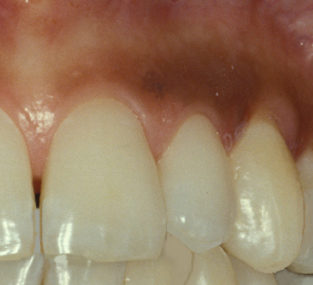We all know that gums tend to be pinkish in color, or possibly reddish when irritated or inflamed. What happens when your gums turn a different color? If you notice dark spots on your gums, you may have a lot of questions.
The good news is that most dark spots aren’t cause for concern. However, sometimes dark spots on your gums can be serious. It helps to know the common explanations and related symptoms so that you know how to react the next time you look in the mirror and ask “why are my gums black?”
Natural Variations in Gum Color
Just as we all have unique hair, noses, and teeth, our gums naturally range in color. Though we tend to think of gums as pink, they can be multiple shades of brown or even black. It’s important to notice the natural color of your gums so that you can identify any areas of concern.
Are you concerned about your gums? Book an appointment today to see how Jefferson can help!
The Causes of Gum Discoloration
Why do gums turn black? Several circumstances can cause changes to gum color, including medical issues and lifestyle choices. If you notice unexplained changes, it helps to narrow down the possible causes so that you can address them.
Melanin
Why are my gums dark? You may have naturally dark gums because your body produces more melanin. If you were born with darker gums, it’s perfectly normal for your body and there’s no reason for concern. On the other hand, if your gums change color over time, it may be related to one of the other causes on this list.
Bruises
Do you have purple gums? It may be difficult to tell, but your gum discoloration could be a bruise. Just like any other part of your body, gums can be bruised and need time to heal.
Eruption Hematoma
This one’s for the kids out there. Parents, don’t freak out if your kiddo has purple or black gums as they are about to cut new teeth. It’s a common occurrence for kids losing baby teeth. Fluid-filled cysts form when the permanent teeth are set to erupt, but if that fluid has blood in it, you get an eruption hematoma. It should clear up on its own once the tooth comes in.
Blue Nevus
Though it sounds a little scary, blue nevi are extremely common. More commonly known as moles, they can look like a freckle on the gums and appear blue or black. It’s generally harmless unless it starts to change in shape or color. Your dentist may keep a close eye on the spot to monitor for changes that could signal another condition.
Amalgam Tattoo
Do you have fillings or crowns in your mouth? It’s possible that the amalgam used for that treatment dislodged and got caught under your gums. When this happens, the spot could be blue, grey, or black. It’s not harmful and doesn’t require treatment.
Medication
Some common medications, including some prescribed for acne and infections, can affect the pigmentation of the gums. It’s an unusual reaction to medication and should be discussed with your doctor to see if you can change prescriptions.
Smoking
Why do your gums turn black from smoking? Along with multiple other issues related to smoking, it’s a common cause for discolored gums. The condition, known as melanosis, is a reaction to the nicotine used in tobacco.
Smoking tobacco triggers your body to produce more melanin, which can cause your gums to turn brown or black. These changes generally begin as patches and can affect your inner cheeks and lower lip.
Medical Conditions
Certain medical conditions can cause oral changes, including black gums. Only a medical professional can diagnose these conditions through appropriate testing.
- Acute Necrotizing Ulcerative Gingivitis, a severe gum infection, can cause gums to turn black or grey.
Addison’s Disease is a disorder that affects adrenal glands and can cause dark spots on the gums and lips. - Oral Cancer can alter the color of your gums, though it generally appears as a black spot rather than overall discoloration.
- Peutz-Jeghers Syndrome, a genetic condition, appears as dark blue or brown freckles that usually appear during childhood. The freckles generally fade over time, but people with Peutz-Jeghers could be at greater risk for developing cancer.
Summary
Gum discoloration can be caused by various factors such as natural melanin production, bruises, eruption hematoma, medication, smoking, and certain medical conditions. While naturally dark gums due to melanin are normal, changes in gum color over time should be investigated. Gum discoloration may also be a symptom of gum infection, Addison’s disease, oral cancer, or even Peutz-Jeghers syndrome. If you notice any unexplained changes in your gum color, it’s best to consult a medical professional for proper diagnosis and treatment.
Treatment for Black Gums
Most black spots on your gums won’t cause you any grief, though you could pursue cosmetic treatments if they bother you. It’s important to discuss your options with your dentist to arrive at the best solution for your oral health.
- Excision of the darkened spots with a scalpel works well, but it may be temporary depending on the underlying cause.
- Cryosurgery, or freezing the gums, reduces the chance of recurrence.
- Gingival grafting involves taking unpigmented tissue from the roof of your mouth and applying it to the affected gums.
As noted above, not all discolorations require treatment, but it’s a good idea to monitor your gums for changes. Keeping regular appointments with your dentist is an excellent way to make sure you don’t miss anything. Remember, they can see the far reaches of your mouth far better than you can!
Summary
There are various cosmetic treatments available to treat black spots on gums, but it’s important to consult with a dentist to determine the best option for your oral health. There are options such as excision of darkened spots, which is a temporary solution, while cryosurgery can reduce the chance of recurrence. Then there’s gingival grafting which involves transplanting unpigmented tissue from the roof of the mouth onto affected gums. However, not all gum discolorations require treatment, and regular dental appointments can help monitor any changes in your gums.
If you have concerns about discolorations or dark spots on your gums, the team at Jefferson Dental & Orthodontics can help. Find the office nearest you and book your appointment today!




